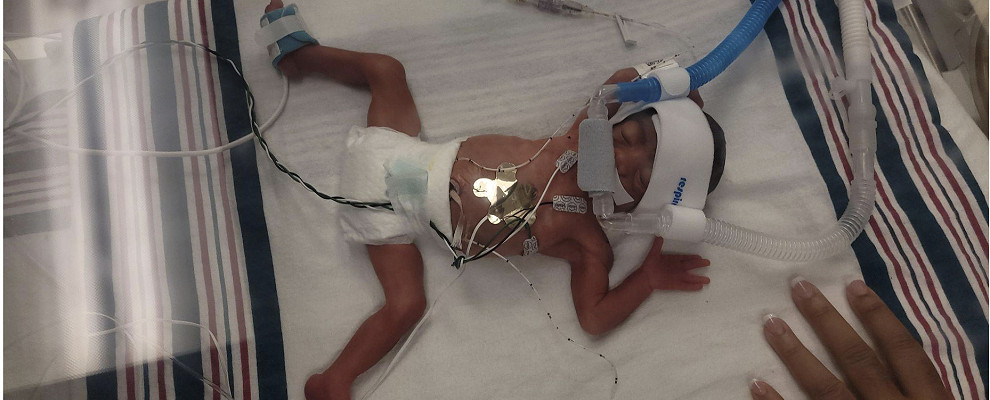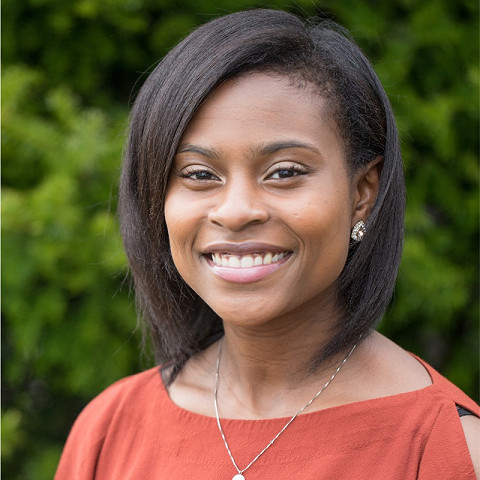Categories:

One Patient’s Search for Equitable Care, and How We Can Collectively Support Advances in Maternal Health Equity for Women of Color
In support of Black Maternal Health Week, I would like to share a personal story.
My nephew, Kaden, was born in December of 2021. He entered this world at 27 weeks and weighed less than two pounds. My sister had to undergo an emergency c-section following a pregnancy that was filled with fear, confusion and uncertainty. Her doctors couldn’t explain why her blood pressure was changing drastically and why her blood levels were so low. She underwent multiple procedures and tests, with no answers to be found. Her case was passed from doctor to doctor.
Along the way, my sister experienced things that are much too common for women of color who are giving birth in the U.S. She was unheard, disregarded and overlooked by the clinical team who was caring for her. A simple example: She asked her doctors multiple times to connect with a prior hematologist for knowledge transfer. It never happened. This was just one instance where my sister did not feel safe and supported by the system.
Today, my nephew is healthy and growing bigger every day. You would never know he started his life in the NICU. The news is less positive for my sister. Her struggles continue. Following Kaden’s birth, she was diagnosed with myelodysplastic syndrome (MDS). It’s very uncommon for someone as young as my sister to be wrestling with this condition. Our next step is a bone marrow transplant, which her team believes will help with a lot of the symptoms she’s been experiencing. Our family is holding out hope that this will finally bring her some relief.
I’ve been there to support my sister at every step of the process. As someone who works in women’s health, I was well aware of the maternal health equity disparities in this country. I’ve seen it firsthand with other friends and family members as well. Now I’ve lived it with my sister. Here are a few observations I have based on our family’s attempts to navigate the healthcare system these past few years.
We all have to advocate for ourselves. My sister had to go to bat for herself every single day when she was pregnant. Family members did the same. It is exhausting, especially for the person who is sick. But you have to be your own advocate, or find someone who can fill that role for you.
It’s easy to say you feel like you’re not being heard. It’s far more difficult to know what to do about it. You can feel helpless, like there’s no clear path forward.
We need care to be a conversation. On the patient side, we have to stop deferring to physicians just because we see them as authority figures. If we have unmet needs, or questions, we have to speak up and ask them. We must be active participants. On the physician side, questions from patients should be seen as opportunities for engagement and education, not as an attack on their expertise or character. In most cases, patients just want to understand, so they can be more comfortable.
We have to slow the speed of healthcare. We are asking too much of clinicians. They are pressed for time, and patient visits are contracted. They don’t have adequate tools to ensure equitable care. We are burning out providers and creating an environment where patients feel rushed. We must find ways to slow things down and remove some of the burdens on clinicians so that we can have a safe space for patient encounters.
Physicians have said the same things to patients a thousand times over, but when you are the patient, it’s the first time you are hearing it. I think often patients miss out on the context and the “why.” Those things are really important, but can easily be glossed over or not discussed at all.
Currently, finding equitable care is like playing a slot machine. You pull the lever and hope you win. Will my care team believe me? Will they hear me? Will they help me? On the first pull, my sister didn’t get lucky. On her second pull, she did. It’s upsetting that this is the reality of our system.
I am thankful that my sister’s care feels much more collaborative and compassionate now, compared to her experiences during pregnancy. The inequities she faced during that time definitely exacerbated her condition, in addition to sustaining fear, confusion and uncertainty in what should have been a beautiful, magical time for her. Even now, she’s missing out on basic experiences, like holding her baby boy because she’s too weak.
My sister’s story is representative of systemic issues that finally are coming to light. There are many great discussions happening across the country, and an emerging commitment to improve maternal health equity. But making real progress requires real change, and it also requires us all to work together. We can’t place all the burden on patients. We can’t place all the blame on providers. Both sides need more support and tools in order to approach care differently moving forward.
I am proud to work for a company where we spend our days empowering patients and equipping providers in a quest to improve maternal health outcomes. Specifically, we are focused on doing our part to tackle health equity as well, understanding that there is no silver bullet solution and that no one organization can effectively address this area alone.
To learn a little more about how Wildflower approaches Black maternal health in our digital solution and alongside advocacy support, please provide your information below. This toolkit also includes sample articles from our in-app resources library that you are free to use with your population.
If you want to hear more of my family’s story, while also learning more about how we can collectively address maternal health equity, I would encourage you to view a recent Fierce Healthcare webinar featuring yours truly, alongside Wildflower’s Chief Operating Officer and the Chief Health Equity Officer for Providence Swedish.
You can view the webinar here:
Interested in learning more about how Wildflower is tackling maternal health equity? Please contact us here.
